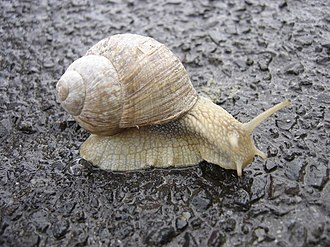Snail



== Snail ==

A snail is a common name for a variety of gastropod mollusks that are characterized by a coiled shell. Snails are found in a wide range of environments, including terrestrial, freshwater, and marine habitats. They are known for their slow movement and the production of mucus, which aids in locomotion and reduces friction.
Anatomy[edit]
Snails have a soft, unsegmented body that is usually protected by a hard, coiled shell. The body is divided into three main parts: the foot, the visceral mass, and the mantle. The foot is a muscular structure used for movement, while the visceral mass contains the internal organs. The mantle secretes the shell and forms a cavity that houses the gills or lungs.
Reproduction[edit]
Most snails are hermaphroditic, meaning they possess both male and female reproductive organs. They typically engage in a mating process where two snails exchange sperm. After fertilization, snails lay eggs in moist environments. Some species are ovoviviparous, meaning they give birth to live young.
Diet[edit]
Snails are primarily herbivorous, feeding on a variety of plant material, including leaves, stems, and flowers. Some species are omnivorous or even carnivorous, preying on other small animals or scavenging dead organic matter.
Habitat[edit]
Snails are highly adaptable and can be found in diverse environments. Terrestrial snails are commonly found in gardens, forests, and fields, while freshwater snails inhabit ponds, rivers, and lakes. Marine snails are found in oceans and seas, often in coral reefs and rocky shorelines.
Ecological Role[edit]
Snails play a significant role in the ecosystem. They are important decomposers, breaking down dead plant material and recycling nutrients back into the soil. They also serve as a food source for a variety of animals, including birds, mammals, and other invertebrates.
Human Interaction[edit]
Snails have both positive and negative interactions with humans. They are considered pests in agriculture due to their feeding on crops. However, some species are also cultivated for food, such as the escargot in French cuisine. Additionally, snails are used in traditional medicine and cosmetic products.
Related Pages[edit]
Categories[edit]
Ad. Transform your life with W8MD's Budget GLP-1 injections from $49.99


W8MD offers a medical weight loss program to lose weight in Philadelphia. Our physician-supervised medical weight loss provides:
- Weight loss injections in NYC (generic and brand names):
- Zepbound / Mounjaro, Wegovy / Ozempic, Saxenda
- Most insurances accepted or discounted self-pay rates. We will obtain insurance prior authorizations if needed.
- Generic GLP1 weight loss injections from $49.99 for the starting dose of Semaglutide and $65.00 for Tirzepatide.
- Also offer prescription weight loss medications including Phentermine, Qsymia, Diethylpropion, Contrave etc.
NYC weight loss doctor appointmentsNYC weight loss doctor appointments
Start your NYC weight loss journey today at our NYC medical weight loss and Philadelphia medical weight loss clinics.
- Call 718-946-5500 to lose weight in NYC or for medical weight loss in Philadelphia 215-676-2334.
- Tags:NYC medical weight loss, Philadelphia lose weight Zepbound NYC, Budget GLP1 weight loss injections, Wegovy Philadelphia, Wegovy NYC, Philadelphia medical weight loss, Brookly weight loss and Wegovy NYC
|
WikiMD's Wellness Encyclopedia |
| Let Food Be Thy Medicine Medicine Thy Food - Hippocrates |
Medical Disclaimer: WikiMD is not a substitute for professional medical advice. The information on WikiMD is provided as an information resource only, may be incorrect, outdated or misleading, and is not to be used or relied on for any diagnostic or treatment purposes. Please consult your health care provider before making any healthcare decisions or for guidance about a specific medical condition. WikiMD expressly disclaims responsibility, and shall have no liability, for any damages, loss, injury, or liability whatsoever suffered as a result of your reliance on the information contained in this site. By visiting this site you agree to the foregoing terms and conditions, which may from time to time be changed or supplemented by WikiMD. If you do not agree to the foregoing terms and conditions, you should not enter or use this site. See full disclaimer.
Credits:Most images are courtesy of Wikimedia commons, and templates, categories Wikipedia, licensed under CC BY SA or similar.
Translate this page: - East Asian
中文,
日本,
한국어,
South Asian
हिन्दी,
தமிழ்,
తెలుగు,
Urdu,
ಕನ್ನಡ,
Southeast Asian
Indonesian,
Vietnamese,
Thai,
မြန်မာဘာသာ,
বাংলা
European
español,
Deutsch,
français,
Greek,
português do Brasil,
polski,
română,
русский,
Nederlands,
norsk,
svenska,
suomi,
Italian
Middle Eastern & African
عربى,
Turkish,
Persian,
Hebrew,
Afrikaans,
isiZulu,
Kiswahili,
Other
Bulgarian,
Hungarian,
Czech,
Swedish,
മലയാളം,
मराठी,
ਪੰਜਾਬੀ,
ગુજરાતી,
Portuguese,
Ukrainian